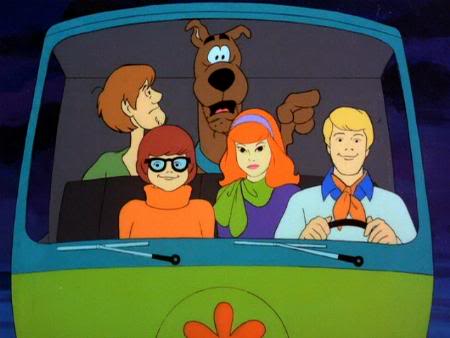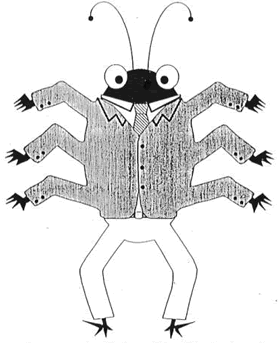I’ll abstract the problem a tiny bit:
- a = the prize in box A
- ka = the potential prize in box B; i.e. “k times larger than a”
- p = the odds of a false positive. That is, the odds that you pick box B only and it got nothing, because dumb machine assumed that you’d pick A too.
- n = the odds of a false negative. That is, the odds that you pick A+B and you get the prize in B, because the machine thought that you wouldn’t pick A.
So the output table for all your choices would be:
- pick nothing: 0
- pick A: a
- pick B: (1-p)ka
- pick A+B: a + nka
Alternative 4 supersedes 1 and 2, so the only real choice is between 3 (pick B) or 4 (pick A+B).
You should pick A+B if a + nka > (1-p)ka. This is a bit messy, so let’s say that the odds of a false positive are the same as the odds of a false negative; that is, n=p. So we can simplify the inequation into
- a + nka > (1-n)ka // subbing “p” with “n”
- 1 + nk > (1-n)k // divided everything by a
- 1 + nk - (1-n)k > 0 // changed sides of a term
- 1 + 2nk -k > 0 // some cleaning
- n > (k-1)/2k // isolating the junk constant
In OP’s example, k=1000, so n > (1000-1)/(2*1000) → n > 999/2000 → n > 49.95%.
So you should always pick B. And additionally, pick A if the odds that the machine is wrong are higher than 49.95%; otherwise just B.
Note that 49.95% is really close to 50% (a coin toss), so we’re actually dealing with a machine that can actually predict the future somewhat reliably, n should be way lower, so you’re probably better off picking B and ignoring A.
I’ll abtract the problem…
Proceeds to teach calculus
BRB, finding a way to insert derivation by parts into that. :^)
Damn dude.
I’d take box A and B because that would get me 1 MILLION DOLLARS. Yes I’m risking 1 BILLION DOLLARS but I’d rather have a guaranteed million.
Hehe thats why I think the original question of Box A being $1000 and Box B being a million was kinda boring, since $1000 is barely anything in today’s world. 3 more zeroes does making things more interesting
I think the major unanswered question is how reliable do we think the machine is? 50%? 100%? I think the most interesting scenario is one where we are convinced that the machine actually predicts the future and always predicts correctly, so I’ll continue with that assumption in mind.
From one point of view, we have no reason not to take both boxes, since we can’t alter the machine’s prediction now, it’s already happened. I think however that this undermines my premise. Choosing both boxes only makes sense if we don’t actually believe the machine predicts the future.
One would be tempted to say "alright, then I will choose only box B, as the machine will have predicted that and I will get lots of money. If I were to choose both boxes, the machine would have predicted that too, and I would get much less money.
My argument is that both answers are wrong in a sneaky way: assuming an actual perfect predictor, my answer is box B only. However, the important part here is that this will not be, in fact, a choice. The result was already determined ahead of time, so I really only had that one option.
Does the machine know that box is not an option? Thinking that A, A+B, and B are all valid options is something I could see an AI doing.
There also isn’t much penalty for taking A+B? You’ll always get at least $1M. And if you took only B, the max you could get is $1M.
Edit: I can’t read lol. I’d still take both, the result is
Predicted A+B: $1M
Predicted B only: $1001M
If you only take box B, the result is
Predicted A+B: $0
Predicted B only: $1000M
I think the machine predicts 2 results, either
Box A is taken = True
OR
Box A is taken = False
Something like:
If (Box A Taken = True) {place ($0) in Box B} else {place ($1,000,000,000) in Box B}Machine doesnt care if you also take Box B, it only cares if Box A is one of the boxes taken. If you take no boxes, Box B would still have a billion dollars, although thats kinda dumb choice from a gameshow host’s perspective.
Box A.
You never know the shenanigans of a machine, and one million is largely enough for me until I die, or if science gives us the option to live forever I bet machines will do the work for us :-)
Edit: as I believe the machine can be wrong, I’d probably take A + B
It’s much easier if you reframe the problem:
Someone says they’ve built a machine that can perfectly predict what you will do. Do you believe them?
If so, take one box.
If not, take both boxes.But even if you don’t believe them, it’s got a 50% chance on a coin toss.
Regardless of whether the machine is right, if you don’t believe it can perfectly predict what you’ll do then taking both boxes is always better than just one.
Yeah, at least you’ll have an extra box to keep your stuff in.
Well if it’s a machine that’s 100% correct in its predictions obviously I’d take box B since that’d be a guaranteed billion - but assuming it’s fallible, I’d go with A+B. A million dollars is plenty of money, I don’t even know what I’d do with a billion.
I’d take both boxes.
We’ve been given no information on the accuracy of the machine’s predictions. Therefore, we have to assume it has just as good of a chance of being wrong as being right. There’s essentially a 50/50 chance that box B has $1,000,000,000 regardless of my choice, so I would choose the option that at least guarantees the smaller prize while still giving me the same chance at the larger prize.
Box A only because ain’t nobody got time for any “Paradox” BS & daddy’s got bills to pay. Trick someone else with all that Time Travel nonsense!
The best case result is 1.001.000.000 (A+B) vs 1.000.000.000 (B) only. Worst case is I have 1.000.000 only.
I go with B only because the difference feels tiny / irrelevant.
Maybe I actually have free will and this is not determism kicking in, but who knows. I‘m not in for the odds with such a tiny benefit.
Worst case is I have 1.000.000 only.
Except that’s not the worst case. If the machine predicted you would pick A&B, then B contains nothing, so if you then only picked B (i.e. the machine’s prediction was wrong), then you get zero. THAT’S the worst case. The question doesn’t assume the machine’s predictions are correct.
Good point. Actually I was assuming that the machine’s predictions were never wrong. That’s also what is defined in the Newcomb’s Paradox wiki page.
If that‘s not a 100% given, you are definitely right.
Well if you actually have free will, how can the machine predict your actions?
What if someone opened box B and showed you what was in it? What would that mean? What would you do?
I meant, let’s imagine the machine predicted B and is wrong (because I take A+B). I would call that scenario „I have free will - no determinism.“ Then I will have 1.000.000.000 „only“. That’s a good result.
Maybe interesting: Wiki - Determinism
Here’s my solution to Newcomb’s Paradox: the predictor can be perfectly infallible if it records your physical state and then runs a simulation to predict which box you’ll pick. E.g. it could run a fancy MRI on you as you are walking through the hallway towards the room, quickly run a faster-than-real-time physical simulation, and deposit the correct opaque box into the room before you open the door. The box, the hallway, the room, the door are all part of the simulation.
Here’s the thing: a computer simulation of a person is just as conscious as a physical person, for all intents of “consciousness”. So as you are inside the room making your decision, you have no way of knowing if you are the physical you or the simulated you. The predictor is a liar in a way. The predictor is telling the simulated you that you’ll get a billion dollars, but stating the rules is just part of the simulation! The simulated you will actually be killed/shut down when you open the box. Only the physical you has a real chance to get a billion dollars. The predictor is counting on you to not call it out on its lie or split hairs and just take the money.
So if you think you might be in a simulation, the question is: are you generous enough towards your identical physical copy from 1 second ago to cooperate and one-box? Or are you going to spitefully deprive them of a billion dollars by two-boxing just because you are about to be killed anyway? Remember, you don’t even know which one you are. And if you are the spiteful kind, consider that we are already making much smaller time-cooperative trade-offs all the time, such as the you-now taking a breath just so that the you-five-seconds-from-now doesn’t suffocate to death.
What if the predictor doesn’t use a MRI or whatever? I posit that whatever prediction method it uses, if the method is sufficiently advanced to be infallible then somewhere in the process it MUST be creating conscious observer instances.
I’d much rather take a sure million with a (slight?) chance of a bonus billion, versus an unknown chance at 0 or a billion. I could do plenty with a million that would significantly change my life for the better.
But I would probably do the opposite if A contained $1000 and B contained a potential million as in the original example. $1000 is a tolerable amount to risk missing out on.
If I wanted to use logic, I’d say taking both A and B is the only way to have a guaranteed $1,000,000 outcome, because B only could get you money but also nothing.
But, if I choose B only, I’m sort of “forcing” the machine into that kind of prediction, right? I don’t know about this experiment, but since your post says it’s a paradox, I think that’s how it works.
So my choice is B only, the machine has predicted it and I get a nice $1,000,000,000.
Am I totally off? :D
Do I have access to a What-If machine and the Finglonger?
Both, like a million dollars guaranteed I could live a comfortable life with that










